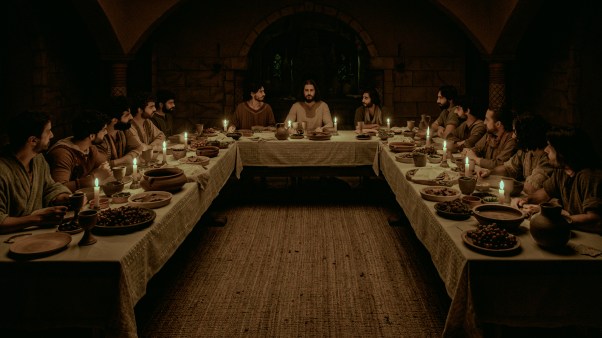This piece was adapted from Russell Moore’s newsletter. Subscribe here.
Those of us who are traditionalist Christians have long said that the Hooters restaurant chain is morally bankrupt, but the time has come for it to be financially bankrupt too. Before we “family values” types take a victory lap, though, we should recognize that the chain—known for its scantily clad female servers and their wink and nod to male sexual appetites—is in trouble not because it’s too edgy but because it is not edgy enough. And that ought to tell us something about the future of American culture and the future of the church.
On one hand, a chain restaurant filing for bankruptcy shouldn’t be all that surprising. The post-COVID-19 years have transformed entire industries, and lots of them have suffered. The restaurant industry, in particular, has seen many chains—Red Lobster, for instance—facing uncertain futures. And, beyond that, no business lasts forever. Each has a life cycle, a rise and fall, just as people do. Yet, as a recent analysis by journalist Annie Joy Williams of The Atlantic shows, Hooters is losing ground for being too tame for an American culture acclimated to online pornography and OnlyFans.
Williams points to the Hooters restaurant in her hometown of Murfreesboro, Tennessee, as an example of the chain’s typical business model “to sell just enough sex to be palatable to people like my Southern Baptist neighbors.”
“There weren’t any strip clubs in my town,” Williams writes. “There was just Hooters, and men could always say they only went there for the wings.”
This psychological dynamic reminds me of a preacher I knew many years ago who would rail with all the fervor of Carrie Nation against the use of “intoxicating beverages” and the kind of people who went to bars. He would make an exception, though, for medical purposes of rye whiskey as a cough suppressant.
Now, the preacher himself seemed to be wrestling with a persistent cough for decades. But he could tell himself he wasn’t like those he saw as degenerates who would outright ask for a beer on a barstool. His psyche could sleep easily—really easily, it turns out—knowing that he could get buzzed purely as a patient, not as a sinner.
In the half century from the sexual revolution to the digital revolution, a man who wished to sexually objectify women beyond what he could see in “respectable” society had to go to a strip club or a roadside sex shop or at least go out to purchase pornographic material from behind the counter in a convenience store. Any of those choices required crossing a psychological threshold—it required a man to admit, at least to himself, that he was intentionally going looking for something his conscience knew was wrong.
Hugh Hefner counted on a certain kind of “respectable” man telling himself and his friends that he read Playboy for the magazine’s cultured profiles of John Updike and Andy Warhol. And the guy at Hooters could claim that the club sandwiches were the real draw—what could he do about how the servers were dressed? Maybe this same man would be the one complaining at the deacon’s meeting at his church about how “immodestly” women were dressing these days.
The internet gave that man a way to pursue his illicit sexual fantasies privately, easily, without ever leaving the house. And it did so in an algorithmic way that allowed him to feel like he wasn’t making an intentional choice at all—that this was merely something that happened to him, that he never went looking to violate his conscience.
More recently, the sexual revolution changed sides with hardly anyone even noticing. The cultural left is still more likely to argue for government-funded contraception or legal abortion or the malleability of gender, but in many newer sexual battles—on #MeToo and sexual trafficking and the ethics of consent—those on the left are often viewed by America’s sexually hedonistic culture not as hippies but as puritans. The new right, on the other hand, invites porn stars to speak at political conventions and celebrates the pornographer (and alleged sex trafficker) Andrew Tate.
The Amherst faculty lounge is still more likely to talk about “ethical polyamory” than a conservative-coded place would—but for many ordinary Americans today, that seems less transgressive than preachy and moralistic. Elon Musk, meanwhile, openly says he doesn’t know whether he is the father of the child yet another woman to whom he is not married claims to be his, and this is met with yawns.
In this kind of environment, Hooters can hardly stay in business by being just “naughty enough.” Indeed, for many people, any moral objections to Hooters have become as quaint as television audiences’ shock at Elvis Presley’s gyrations or The Beatles’ long hair. As one “adult performer” told Williams at The Atlantic, Hooters is “just too tame for today’s customer.”
If Hooters is indeed not long for this world, we should be glad. These restaurants were always about exploiting economically vulnerable women. (Williams also quotes the manager of a strip club asking, “What’s the difference between a Hooters waitress and a stripper?” His chilling answer, which reflects the effects of desperation for food and shelter: “about six weeks.”) Indeed, Hooters was built on the willingness of an abundance of men to ignore the fact that the women working there are human beings made in the image of God, not meat for inspection and consumption.
But we should take no solace in how these places are dying. The chain is not closing because a superior view of marriage and family and sexuality won the argument. In a real sense, Hooters is gone because the argument was so decisively lost.
The nightclub down the road from you might be empty—but it’s because the people who once went there now prefer to get drunk at home, bingeing Netflix alone. The teenager next door to you might not be having premarital sex—but it’s more likely because he’s never around people in real life than because he’s crucified his lust with the gospel.
That ought to remind us of what Jesus and his apostles already taught us: Fallen, broken human nature might manifest itself in different ways, but, between Eden and Armageddon, it’s the same old fallenness and brokenness. And we must give the same old answer to it all. Culture-war coding can occasionally remix who takes what side in debating sexual restraint versus sexual license, but it can’t produce chastity and fidelity. The gospel can—and that’s much harder than choosing a tribe.
Hooters can also remind us that appealing to what the Bible calls “the flesh” is always, in the long run, a losing strategy, even on its own terms. The human appetites that can call the shots in our lives are not always sexual. Sometimes we are enthralled to other carnal appetites: lust for wrath and revenge or cruelty or envy.
Some would-be Christian influencers argue that, to keep up with young men, the church should be “edgy,” embracing anything and everything up to the line of explicit white ethno-nationalism. This is immoral, full stop. But it’s also self-defeating, as self-defeating as a parenting strategy of giving children a little bit of cocaine every night to keep them from trying heroin. And it never stops there. There is always someone edgier, someone who’s gone a bit further out of the Overton window. Cultural engagement built on winking, aren’t-we-naughty transgression always requires escalation. If you live by carnality, you will die by carnality.
The Hooters parking lot down the road might be emptier than it used to be. But will your church’s lot be fuller? What if your church were a place that offered something strange to an era of rule by appetite? What if it were a place where men and women learned to serve and love each other, not to use each other? What if instead of asking our young men to choose which appetites will govern them—sex or rage or ambition—we modeled what it would look like to put to death any and all of the passions that seek to enslave us? What if we offered a new picture to young women who’ve been told that their worth is measured in their sexual attractiveness and sexual availability? What if we showed them a vision of being joint heirs in Christ, loved and valued for who they are instead of how they can be used?
Exchanging one form of exploitation for another does not a counterrevolution make. But a church that offers the quiet power of the ordinary means of grace, of the ancient call to fidelity, is revolutionary still.
Russell Moore is the editor in chief at Christianity Today and leads its Public Theology Project.




















